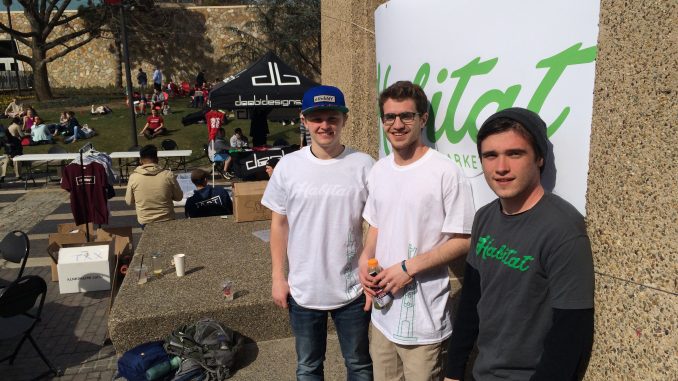
After trying to buy a pair of sneakers on Craigslist to resell on eBay, senior Andrew Nekkache decided there had to be a better way for people in college communities to buy, sell and trade.
He reached out to a friend to share his idea for a place dedicated to student consumers and entrepreneurs that was fun and easy to use.
“I thought it would make more sense for there to be a student marketplace that just looked good, looked clean, and it was only for students, so you’d know that there would be trust with that,” the economics major said. “And it would be designed for locals, so it would be only you and your campus.”
With help from friends, like seniors Brandon Bahr and Mike Paszkiewicz, Nekkache created Habitat, an app that allows students to sell anything from textbooks to clothes, which officially launched April 2.
Nekkache said he hopes Habitat will also serve as a platform for entrepreneurship.
“There are all these great ventures, and they all have great products, but [students] don’t have a platform to sell their goods and services,” Nekkache said. “With Habitat, we’re not only building a platform, but we’re building the audience too.”
To start selling or buying a product, students can sign up using their Temple email addresses and, similar to eBay, students can enter information about their products for others to buy or submit requests to buyers expressing interest.
Once a seller accepts the request, the two parties are connected through a private chat, which allows them to meet and exchange the good or service.
The payment process involves a “rating service,” which helps reduce the incentive for people to try to undermine each other, Nekkache said. The credit card information of the user is stored so that after the exchange, the customer can rate their experience and provide payment virtually.
“We all have the same problem where we go on this Facebook group, ‘Temple free for sale,’ and there’s 2,700 students that are on this Facebook group, and it’s completely ineffective,” Nekkache said. “You have to be like Sherlock Holmes trying to figure out and investigate and see if it’s a good deal or not.”
Unlike Facebook, Habitat was designed specifically for commerce, Paszkiewicz said, in an effort to make the process more simple and safe.
Though the app is in its early stages, Nekkache plans to launch similar versions at other campuses across the Greater Philadelphia area.
“We’re starting here – starting at the campus that we know best,” he said. “And then we’re trying to expand on a campus-by-campus basis.”
Nekkache said he aims to get the University of Pennsylvania, Drexel University and West Chester University involved with the app, so they will each eventually expand to have their own “habitats,” he said.
“[Habitat is] going to allow students to meet students from UPenn that they would have never met without Habitat,” Nekkache said.
“I think a lot of people use Facebook and Instagram and Twitter, but rather than bringing people together they actually tear people apart because people are staring at their phones,” he added. “We’re starting with commerce, but we’re bringing people together.”
Alexa Bricker can be reached at abricke1@temple.edu.



Be the first to comment